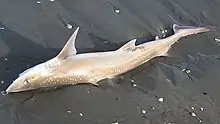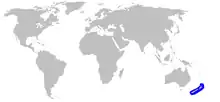Spotted estuary smooth-hound
The spotted estuary smooth-hound or rig (Mustelus lenticulatus) is a houndshark of the family Triakidae, found on the continental shelves and in estuaries around New Zealand.[2] It is closely related to the gummy shark (Mustelus antarcticus) of Australia.[3] Males can grow up to a length of 125 cm, while females can reach a length of 151 cm.[2]
| Spotted estuary smooth-hound | |
|---|---|
 | |
| Scientific classification | |
| Domain: | Eukaryota |
| Kingdom: | Animalia |
| Phylum: | Chordata |
| Class: | Chondrichthyes |
| Order: | Carcharhiniformes |
| Family: | Triakidae |
| Genus: | Mustelus |
| Species: | M. lenticulatus |
| Binomial name | |
| Mustelus lenticulatus Phillipps, 1932 | |
 | |
It is commercially fished, and is commonly served in fish and chip shops in New Zealand under the name "lemonfish".[4] In June 2018 the New Zealand Department of Conservation classified the spotted estuary smooth-hound as "not threatened" with the qualifier "conservation dependent" under the New Zealand Threat Classification System.[5]
References
Wikimedia Commons has media related to spotted estuary smooth-hound.
- Finucci, B.; Kyne, P.M. (2018). "Mustelus lenticulatus". IUCN Red List of Threatened Species. 2018: e.T39356A116736541. doi:10.2305/IUCN.UK.2018-2.RLTS.T39356A116736541.en. Retrieved 19 November 2021.
- Carpenter, Kent E.; Binohlan, Crispina B. "Mustelus lenticulatus Phillipps, 1932 Spotted estuary smooth-hound". Fishbase. Retrieved 21 January 2019.
- Gardner, M.G.; Ward, R.D. (2002). "Taxonomic affinities within Australian and New Zealand Mustelus sharks (Chondrichthyes: Triakidae) inferred from allozymes, mitochondrial DNA and precaudal vertebrae counts". Copeia. BioOne. 2002 (2): 356–363. doi:10.1643/0045-8511(2002)002[0356:TAWAAN]2.0.CO;2. S2CID 85403536. Retrieved 12 January 2015.
- Ballance, Alison (5 March 2015). "Tracking Rig Sharks". Radio New Zealand. Retrieved 21 January 2019.
- Duffy, Clinton A. J.; Francis, Malcolm; Dunn, M. R.; Finucci, Brit; Ford, Richard; Hitchmough, Rod; Rolfe, Jeremy (2018). Conservation status of New Zealand chondrichthyans (chimaeras, sharks and rays), 2016 (PDF). Wellington, New Zealand: Department of Conservation. p. 10. ISBN 9781988514628. OCLC 1042901090.
Endemic marine fish of New Zealand | |
|---|---|
|
| Taxon identifiers |
|
|---|
This article is issued from Wikipedia. The text is licensed under Creative Commons - Attribution - Sharealike. Additional terms may apply for the media files.
